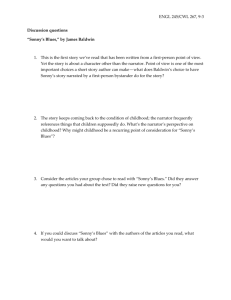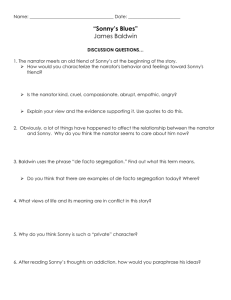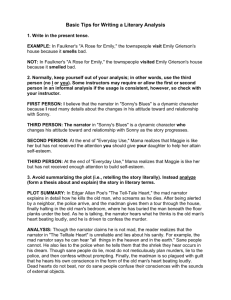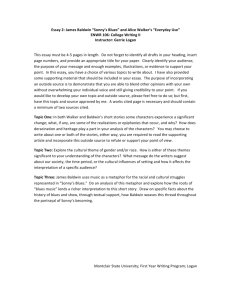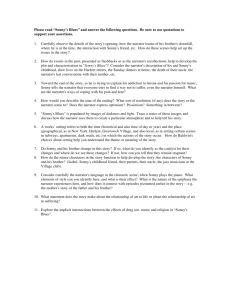Tillie Olsen's “I Stand Here Ironing” and James Baldwin's “Sonny's
advertisement
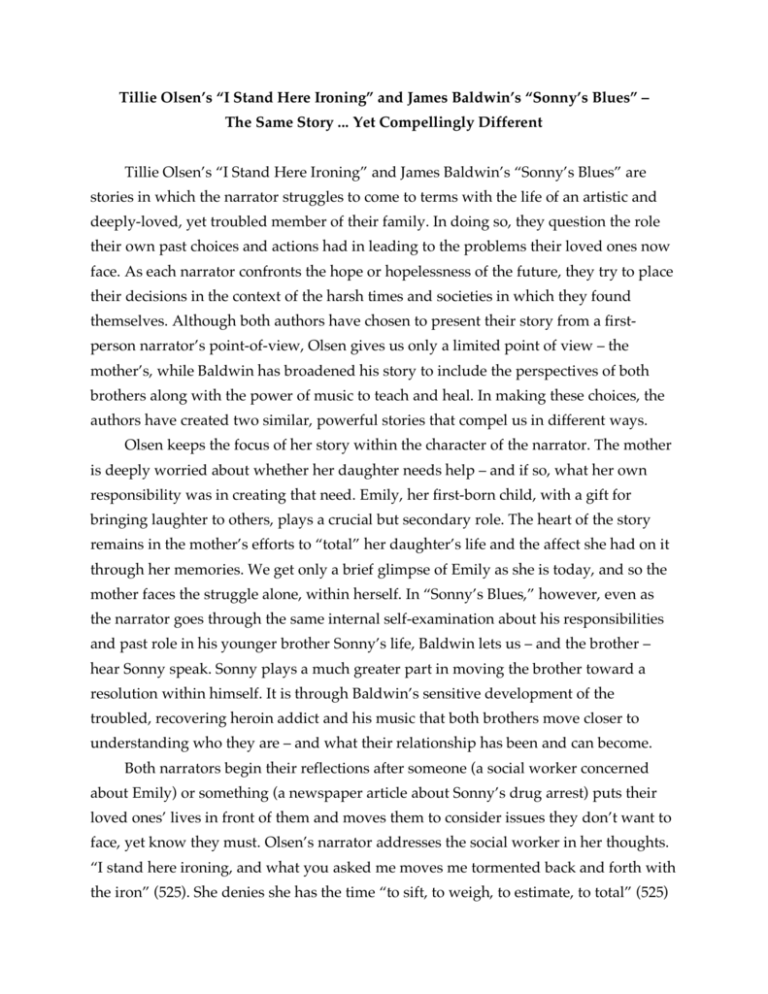
Tillie Olsen’s “I Stand Here Ironing” and James Baldwin’s “Sonny’s Blues” – The Same Story ... Yet Compellingly Different Tillie Olsen’s “I Stand Here Ironing” and James Baldwin’s “Sonny’s Blues” are stories in which the narrator struggles to come to terms with the life of an artistic and deeply-loved, yet troubled member of their family. In doing so, they question the role their own past choices and actions had in leading to the problems their loved ones now face. As each narrator confronts the hope or hopelessness of the future, they try to place their decisions in the context of the harsh times and societies in which they found themselves. Although both authors have chosen to present their story from a firstperson narrator’s point-of-view, Olsen gives us only a limited point of view – the mother’s, while Baldwin has broadened his story to include the perspectives of both brothers along with the power of music to teach and heal. In making these choices, the authors have created two similar, powerful stories that compel us in different ways. Olsen keeps the focus of her story within the character of the narrator. The mother is deeply worried about whether her daughter needs help – and if so, what her own responsibility was in creating that need. Emily, her first-born child, with a gift for bringing laughter to others, plays a crucial but secondary role. The heart of the story remains in the mother’s efforts to “total” her daughter’s life and the affect she had on it through her memories. We get only a brief glimpse of Emily as she is today, and so the mother faces the struggle alone, within herself. In “Sonny’s Blues,” however, even as the narrator goes through the same internal self-examination about his responsibilities and past role in his younger brother Sonny’s life, Baldwin lets us – and the brother – hear Sonny speak. Sonny plays a much greater part in moving the brother toward a resolution within himself. It is through Baldwin’s sensitive development of the troubled, recovering heroin addict and his music that both brothers move closer to understanding who they are – and what their relationship has been and can become. Both narrators begin their reflections after someone (a social worker concerned about Emily) or something (a newspaper article about Sonny’s drug arrest) puts their loved ones’ lives in front of them and moves them to consider issues they don’t want to face, yet know they must. Olsen’s narrator addresses the social worker in her thoughts. “I stand here ironing, and what you asked me moves me tormented back and forth with the iron” (525). She denies she has the time “to sift, to weigh, to estimate, to total” (525) her daughter’s life. Baldwin’s narrator considers, “I read about it in the paper, in the subway, on my way to work. I read it, and I couldn’t believe it, and I read it again” (627). His narrator, too, has tried to avoid facing Sonny’s problems, and even after realizing their seriousness, he feels, “all this was carrying me some place I didn’t want to go” (629). Yet, each narrator does consider what is troubling them, and we follow them as they remember and reflect upon Emily’s and Sonny’s entire lifetimes within the course of the stories. The mother in “I Stand Here Ironing” says she does not want to be “engulfed with all I did or did not do, with what should have been and what cannot be helped” (525), yet that is exactly what she proceeds to do. She takes herself and us through the nineteen years of Emily’s life as she stands ironing the family laundry one evening. It is a hard, self-judgmental look at the choices she made in order for her and Emily to survive in the “pre-relief, pre-WPA world of the depression” (526). In a similar manner, when Sonny returns to New York, his brother begins to consider both of their the lives. “When I saw him, things I thought I had forgotten came flooding back to me. This was because I had begun, finally, to wonder about Sonny, about the life that Sonny lived inside” (631). Sonny’s brother had been busy with his own life – college, marriage, the military, his family – and didn’t want to face the trouble toward which Sonny might be heading. Years before, after their mother’s funeral, he tried to find out something about Sonny’s life, perhaps for the very first time. “I’d never played the role of the older brother quite so seriously before, had scarcely ever, in fact, asked Sonny a damn thing” (637). But when Sonny tried to express his overwhelming desire to become a musician, his brother immediately told him, “‘Be serious’” (637). When Sonny learned he would now have to live with his brother’s wife’s family while he finished high school, he tried to tell his brother of his need for his music and his need to get out of Harlem. Sonny’s practical older brother, trying to get on with his own life, was worried about how Sonny would make a living, and so did not understand that when Sonny told him that music was his life – that it was “life or death to him” (641). His brother believed that education, not music, could be Sonny’s salvation and so asked him to put up with the arrangements. “‘Sonny. You hear me?’ He pulled away. ‘I hear you, but you never hear anything I say’” (639). Through their exchange, Baldwin gives us not only the reasons for the brother’s decisions about 2 Sonny, but he also gives us a greater sense of who Sonny is and what his own struggles are. In “I Stand Hear Ironing, although we learn why the mother made the choices she did at the times she made them, we only get a sense of Emily through an evening’s worth of her mother’s memories. She remembers the hardships and isolation – along with a glimpse of the sensitivity and comedy Emily somehow has within her – that made up Emily’s life. We learn from Emily’s mother as she admits to herself, even as she denies it, all that has gone into making Emily the person she is. I will never total it all. I will never come in to say: She was a child seldom smiled at. [...] She was a child of anxious, not proud, love. We were poor and could not afford for her the soil of easy growth. [...] My wisdom came too late. She has much to her and probably nothing will come of it. She is a child of her age, of depression, of war, of fear. (531) We know the hard, lonely times Emily has been through, and we get glimpses into the way Emily began pulling away from her mother, the way she became less and less affectionate, the way she always felt unsure of herself. But, even with the mother’s memories – as she remembers with honesty and guilt and rationalization – we never feel that we know who Emily is today and in what ways that early life of emotional deprivation affects her now. When we finally meet and hear the present-day Emily as she comes home at the end of the evening, even then she speaks about her mother. “‘Aren’t you ever going to finish the ironing, Mother? Whistler painted his mother in a rocker. I’d have to paint mine standing over an ironing board’” (530). A few more simple exchanges end with the unsettling words from Emily, “‘in a couple of years when we’ll all be atom-dead they won’t matter a bit’” (531). But the mother is weary and, “because I have been dredging the past, and all that compounds a human being is so heavy and meaningful in me, I cannot endure it tonight” (531) She doesn’t pursue Emily’s feelings, even though they worry her. Olsen keeps Emily at arm’s length, and the story remains the mother’s. Emily isn’t a part of her mother’s solution. Within both Emily and Sonny, there is a something that needs to be heard. In each story, there is a sense that the gift of artistry, whether it is music or laughter, can help heal someone’s soul. Yet, even in trying to understand Emily’s gift of comedy, the mother never completely empathizes with Emily’s need to move beyond the roles of 3 “mother, and housekeeper, and shopper” (530) – the roles she has always performed as the eldest daughter of four younger siblings. The mother has led a hard life, too, and sees Emily’s life from that perspective. “So all that is in her will not bloom – but in how many does it?” (531). In explaining how Emily first came to use her talent to entertain others outside the family, the mother recalls how at night after the other children had gone to bed and Emily sat with her as she finished up the days’ never-ending work, “Sometimes, to make me laugh, or out of her despair, she would imitate happenings or types at school” (530). Then mother remembers, “I think I said once: ‘Why don’t you do something like this in the school amateur show?’” (530). She may or may not have said that, but it makes her feel better to think she was the one who recognized Emily’s talent and who encouraged her to pursue it, even though the gift “has as often eddied inside, clogged and clotted, as been used and growing” (530). The mother still wonders, “Where does it come from, that comedy?” (527). She doesn’t completely accept the depths of Emily’s gift and what it might mean to Emily. Emily has been in growing demand as a performer at other high schools and colleges, even at statewide affairs, and the mother has gone to see her on the stage. The first one we went to, I only recognized her that first moment when thin, shy, she almost drowned herself into the curtains. Then: Was this Emily? The control, the command, the convulsing and deadly clowning, the spell, then the roaring, stamping audience, unwilling to let this rare and precious laughter out of their lives. (530) Even after the mother sees how her comedy transforms Emily, she doesn’t really feel it. In not fully understanding it – or perhaps in not knowing how to nurture it – she doesn’t see it as the way that Emily will bloom. When someone suggests to her that something should be done with Emily’s incredible gift, she wonders “without money or knowing how, what does one do?” (530). The mother has lived a life in which all the decisions she has made were based on lack of money and time – it affected who Emily was as a child, and it affects her today. Emily’s comedy never takes her mother to a greater understanding of her need to become her own person. It remains something the mother sees as both good and bad for Emily, and the real role it might play in Emily’s life is left as something the mother feels would be nice, but not necessary for Emily. In Baldwin’s story, Sonny and his music play a much greater role in moving the narrator toward an understanding of both Sonny and himself. Although Sonny’s 4 brother had never felt the power of music as Sonny had, he began to sense it just a few weeks after Sonny had been living with them. Sonny’s brother looked out his window and saw an old-fashioned revival meeting across the street. As he watched, he became drawn into the music and he saw and felt something he hadn’t experienced before. “As the singing filled the air the watching, listening faces underwent a change, the eyes focusing on something within; the music seemed to soothe a poison out of them” (643). Sonny comes home just as his brother begins to feel the power of the music. Sonny asks if he would like to come hear him “sit in with some fellows in a joint in the Village” (643) that evening. Sonny uses the music they both just heard from the revival to try and explain a little about himself and how the drugs felt to him. “When she was singing before,” said Sonny, abruptly, “her voice reminded me for a minute of what heroin feels like sometimes – when it’s in your veins. It makes you feel sort of warm and cool at the same time. And distant. And – and sure.” [...] “It makes you feel – in control. Sometimes you’ve got to have that feeling.” (644) Sonny knew this would be a hard conversation with his brother, but he makes the attempt to help him understand what he’s been through and will continue to face. And it is a difficult conversation for both. His brother is angry, yet he, too, makes the attempt to listen to Sonny. “Something told me that I should curb my tongue, that Sonny was doing his best to talk, that I should listen” (644). In their honest, painful conversation, the brothers speak and listen to each other. We sense the despair felt by both of them as they speak of drugs and life and suffering. Sonny wants his brother to know that “it can come again” (646), but his brother has already made a silent promise to himself that “I would never fail him again” (645). They do hear each other, finally. That evening, as Sonny’s brother is introduced to the other musicians, he realizes that “it was clear that, for them, I was only Sonny’s brother. Here, I was in Sonny’s world” (647). He sees the respect Sonny commands, and it moves him to see him as his own man. As Sonny begins playing, he is “troubled, he was working hard, but he wasn’t with it” (648). The brother senses that the others are letting Sonny find his way, the way he must let Sonny. Creole, the bass fiddler, seemed to control everyone – but he was listening to Sonny. And as Creole waited for Sonny to “leave the shore line and 5 strike out for deep water” (648), Sonny’s brother began to understand the power of music in his brother’s life, and the effect his music has on others. Later, as the musicians start to play “Am I Blue,” Sonny’s brother listens and hears even more. “For, while the tale of how we suffer, and how we are delighted, and how we may triumph is never new, it always must be heard” (649). Sonny made the blues his own – and at the same time, he made it everyone’s. His brother “seemed to hear with what burning he had made it his, with what burning we had yet to make it ours, how we could cease lamenting. Freedom lurked around us and I understood, at last, that he could help us to be free if we would listen, that he would never be free until we did” (649). Neither story comes to a neat, happy resolution. Emily’s mother wants Emily to have hope, but doesn’t know how to give it to her. Her final thoughts at the close of “I Stand Here Ironing” are almost a prayer for Emily: “Only help her to know – help make it so there is cause for her to know – that she is more than this dress on the ironing board, helpless before the iron” (531). The mother has let herself wonder and worry and consider Emily’s life – but only within herself. When it comes time to speak to Emily, we feel she will continue to keep it inside and won’t bring it out into the open. Even in her prayer, she asks for someone else – God, the social worker – to help Emily know that she can be more than she is, or more than what her mother has had to be. We know now that the mother cares, and that Emily has lived a life where “she had to keep too much within herself” (531), but without a chance to know the nineteen-year-old Emily and what she thinks and believes, we have a harder time getting a sense of whether Emily will be “more than this dress” or whether she will remain “helpless before the iron.” There is more of a feeling of a connection between the brothers at the end of “Sonny’s Blues,” but it is no more clear whether Sonny will kick his addiction or not. Sonny’s brother listens to Sonny’s music, and thinks to himself, “I heard what he had gone through, and would continue to go through until he came to rest in earth” (649). As he has heard Sonny – both Sonny’s words and his music – he begins to feel that no matter how or when Sonny’s life ends, his music would be with him, giving him some sort of comfort, a feeling of past and present and future, until that day. “And I was yet aware that this was only a moment, that the world waited outside, as hungry as a tiger, and that trouble stretched above us, longer than the sky” (649). Even if Sonny succumbs 6 to his addiction, he will continue to use his music to take him beyond the suffering of the everyday world they face. Sonny’s brother sends him a Scotch and milk before his next song. “He didn’t seem to notice it, but just before they started playing again, he sipped from it and looked toward me, and nodded” (650). In that simple gesture, we see the brothers acknowledge each other and all they have been through – and there is a sense they will be together no matter what the future may hold. In both stories, Olsen and Baldwin address many of the same issues of identity, responsibility, and societal pressures. Through them, we learn about Emily’s mother and Emily, and Sonny’s brother and Sonny – and we feel the mother’s and brother’s hope that Emily and Sonny will survive and flourish as people and the fear that they won’t. Yet, despite these similarities, the focus of each story is reflected in its title. “I Stand Here Ironing” is about the mother as she tries to come to a resolution within herself about her daughter’s life while “Sonny’s Blues” is about Sonny’s life and the way his music moves to bring about understanding to both Sonny and his brother. As we read each story, we can appreciate the path each author has chosen. The same story has become two very different stories in the hands of two thoughtful authors. 7 WORKS CITED Baldwin, James. “Sonny’s Blues.” The Heath Introduction to Fiction. 6th ed. Ed. John J. Clayton. Boston: Houghton Mifflin Company, 2000. 627-650. Olsen, Tillie. “I Stand Here Ironing.” The Heath Introduction to Fiction. 6th ed. Ed. John J. Clayton. Boston: Houghton Mifflin Company, 2000. 525-531. Cindy Tsutsumi November, 2001 8
